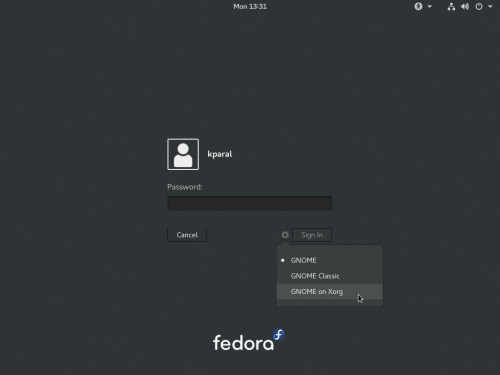This page documents common bugs in Fedora 28 and, if available, fixes or workarounds for these problems. If you find your problem in this page, do not file a bug for it, unless otherwise instructed. Where appropriate, a reference to the current bug(s) in Bugzilla is included.
Release Notes
Read the F28_Beta_release_announcement for specific information about changes in Fedora 28 and other general information.
My bug is not listed
Not every bug is listed in this page, but Bugzilla should be a comprehensive database of known bugs. This page is a sampling of the bugs most commonly discussed on our mailing lists and forums.
To see if your bug has already been reported, you can search Bugzilla. If it has not yet been reported, we encourage you to do so to help improve Fedora for yourself and others. A guide to Bugs and feature requests has been prepared to assist you.
If you believe an already-reported bug report should be added to this page because it is commonly encountered, you can:
- Add it yourself, if you have wiki access. Common bugs instructions provides guidance on how to add an entry to the page correctly, but the most important thing is to make sure that the bug is listed - don't worry if you don't get the format quite right, we can clean it up later.
- Or, add the CommonBugs keyword to the bug report. Someone from the QA team will then inspect the issue to determine whether the bug should be listed as a common bug. To expedite your request, please add a comment to the bug that includes
- a summary of the problem
- any known workarounds
- an assessment on the impact to Fedora users
For reference, you can query Bugzilla for bugs tagged CommonBugs:
- CommonBugs? (bugs with CommonBugs keyword, but do not yet have a link to this page)
- CommonBugs+(bugs with CommonBugs keyword and contain a link to this page)
Installation issues
Switching keyboard layout with key combo does not work in Wayland
link to this item - Bugzilla: #1389959
If you're running Workstation Live install media and configure multiple languages in the installer, you won't be able to switch between them using the standard system shortcut (typically ⊞ Win+Space or Alt+⇧ Shift). However, you can still click on the language indicator in the installer with the mouse and that will switch the languages.
This does not affect other install media (KDE Live, DVD and netinst images).
Installer on several live images does not offer iSCSI support
link to this item - Bugzilla: #1395620 - Bugzilla: #1429132
On many or all Fedora Live images, the installer will not offer iSCSI functionality (the "Add iSCSI target" button will not appear in the 'Specialized & Network Disks' screen). You can avoid the problem by running sudo dnf install udisks2-iscsi from a console before starting the install process, or by installing from a dedicated installer image rather than a live image.
Upgrade issues
GRUB update might fail if /boot is on XFS
link to this item - Bugzilla: #1227736
If you use XFS filesystem on /boot and upgrade your system, you might end up in a GRUB minimal prompt (just a command prompt, no kernel to choose from interactively) after the upgrade is complete. The problem is in the system rebooting while XFS is in dirty state and not all changes being saved to the filesystem yet.
In order to prevent this issue, you might try to disable plymouth (by removing rhgb kernel boot option) during the upgrade or uninstall it prior the upgrade (these workarounds were not tested).
If this already occurred to you, you should be able to fix the problem by booting a Live or rescue image, mounting the filesystem in question (which should replay the journal), perhaps running xfs_repair to make sure there are no more issues. In the worst case, you'll also need to fully re-install grub.
Core system issues
GNOME issues
Wayland issues
Wayland is the replacement for the legacy X11 display stack. Although development has been rapid and Wayland is usable in most situations, some bugs remain. Please see the following link to learn the details:
Please check the list for your issue before you file a new bug, although if you're not sure, filing a new bug is the right thing to do.
Wayland is currently enabled by default only in GNOME. If you want to disable it, select GNOME on Xorg as session type when logging in (you only see this screen if your user has a password defined):
Totem fails to play media on Wayland in virtual machines
link to this item - Bugzilla: #1467368
Totem (Videos) will fail to play media when using a Wayland session in virtual machines (applies to default libvirt VMs, but not VirtualBox). The audio will play, but neither video nor a totem window will appear. If you need to play media in this environment, please either use X11 session, or a different media player.
Scroll events are not sent into virtual machines from touchpad/trackpoint under Wayland
link to this item - Bugzilla: #1386602
Under Wayland, sending scroll events into a virtual machine works well when using the mouse, but doesn't work when using touchpad or trackpoint. As a workaround, switch to Xorg session on your host.
link to this item - Bugzilla: #1497897
Some users have reported that, sometimes, the icon and text of the VPN entry in the GNOME status menu (the one that appears when you click the top-right of the screen) does not appear. Usually it will show a lock icon and the text 'VPN Off' (or information on any active VPN connection), but it appears that occasionally the icon and text do not appear; the menu just appears to contain an entirely empty row. The entry does function as intended.
No fix for this issue is yet known, but it has no functional impact - you can still use the 'empty' menu item.

